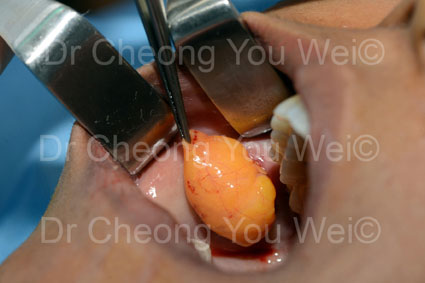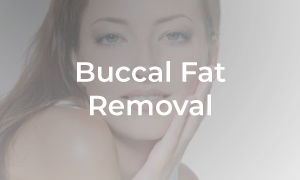Buccal Fat Removal
Buccal Fat Removal
Puffy cheeks make the face appears round, sometimes even give the impression of a ‘chipmunk’ face. A puffy cheek is usually due to the excessive buccal fat located inside the cheek. Buccal fat removal can reduce the puffy cheek and make the face looks slimmer.

Buccal fat delivered from the opening in the buccal mucosa during surgery.
Preparation
-
-
-
Inform the doctor of any pre-existing medical conditions and drug allergy. All medical conditions must be treated and stabilized before surgery.
-
Stop smoking at least one week before surgery. Smoking is harmful to wound healing and increases the risks of other post-operation complications.
-
Stop the following medications and supplements from one week before surgery until one week after surgery.
-
All supplements containing vitamin E, ginseng, ginkgo, garlic, fish oil, and other ingredients that increase bleeding during the procedure. Other supplements, traditional medicine, and herbs, in which ingredients are unknown, have to stop as well.
-
Medicine that increases bleeding during the procedure such as aspirin, NSAIDs, and warfarin. However, you may need to consult your physician who prescribed the medication before you stop them.
-
-
On the day of surgery, wear simple and comfortable clothing. Do not wear any makeup. Do not wear any jewellery and metal objects on the face and body.
-
-
Surgery
Duration: One hour
Anaesthesia: Local anaesthesia
Hospitalisation: Not required.
Recovery*: Back to work in 1-3 days, light exercise after 2 weeks, heavy exercise after 3-4 weeks. * The actual speed of recovery may vary from person to person
Surgery Technique: A small incision is made on the buccal mucosa inside the mouth. Buccal fat is identified and removed. The wound is closed with an absorbable sutures that don’t need to be removed. There are no external wounds and scars.
Post-operative Care**
-
-
-
What to expect:
-
Swelling usually peaks on the second to third day after surgery and will gradually subside after that. Post-operative pain is usually minimal.
-
-
General care
-
Avoid hot foods and drinks. Take soft diet and drink a lot of water.
-
Apply cold pack first 3 days and warm pack after that. Elevate the head during sleep to reduce swelling.
-
Avoid smoking for at least one month. Smoking increases the risk of wound complications.
-
Adequate rest and sleep are helpful for a speedy recovery.
-
Be relaxed and calm. Contact the clinic if there are any queries.
-
-
Medicine: Finish the oral antibiotics as prescribed. Take the painkiller as prescribed when necessary.
-
Wound care: Regular gargles with normal saline or mild mouthwash.
-
Physical activity: Avoid heavy physical activity and exercise for at least one month.
-
Follow-up: Come back one week after surgery for review.
-
Emergency: If there is heavy bleeding, a rapid increase in swelling or severe pain, immediately contact the clinic/doctor for advice.
-
-
** The instructions in this list are only for general guidance. If you have any specific queries or concerns during the post-operative recovery, please contact the clinic for further advice.








